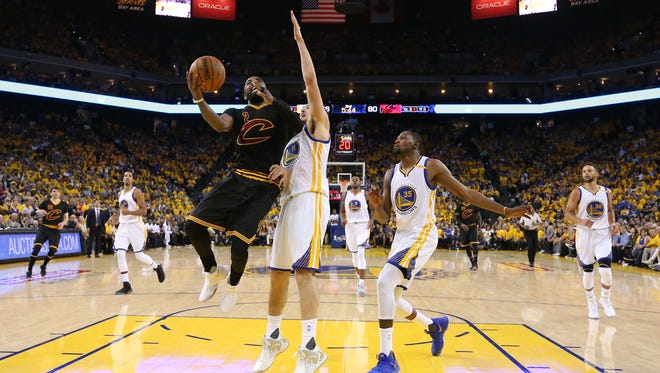Bell: Cavs need a change of pace to have chance vs. Warriors

CLEVELAND – LeBron James seemed to be offended by the mere suggestion.
Slow it down?
“That’s not our game,” LBJ flatly dismissed. “We don’t play slow-down basketball.”
The Cleveland Cavaliers are in an 0-2 hole again as they’ve come home for a reset of the NBA Finals, which is why pace was the word of the day circulating through The Q on Tuesday.
Something must change. The run-and-gun Golden State Warriors committed 20 turnovers in Game 2 and still blew out the Cavs. Trying to beat these Warriors at their own game – and four times at that, to win the championship – is asking for major trouble.
Yet the Cavaliers, who fought back from 0-2 and 1-3 deficits to stun Golden State in the Finals last year, are in no mood to play along with the narrative.
“We play at our pace,” James said. “We play our game. We got to this point playing this way. We have won a lot of games playing the way we play, so we’re not going to change.”
Latest NBA Finals coverage:
Up 2-0 on Cavs, last year's Game 3 serves as cautionary tale for Warriors
Defiant Cavs won't concede identity vs. Warriors ahead of Finals Game 3
Pat Riley calls Magic Johnson "the best ever"
Such defiant expression reflects a view of the Cavs that goes beyond the current doomsday scenario. They are tough, gritty and resilient. If they can somehow transform that into a style that knocks the Warriors out of sync, then they’ll have a chance to make this a series after all.
Yet for all of the we-are-who-we-are bravado – and it doesn’t come from just James, as Kevin Love, Kyrie Irving and coach Tyronn Lue echoed similar sentiments – they can get a reality check from the numbers.
Sure, if James, whom Love likened to a locomotive, is flowing downhill to the basket on a fast break, there’s no need to slow down that high-percentage opportunity. Irving, meanwhile, is the fastest player on the team and maybe the best ball-handler in the league. If he can push it up the floor, so be it.
It’s just that over the course of 48 minutes, the Cavaliers don’t need to mimic the Warriors to beat them. That’s not who they are. Consider:
- During the regular season, when the Warriors led the NBA with 22.6 fast-break points per game, the Cavaliers ranked 15th at 12.9. Golden State has the best playoff average, too (21.9), while Cleveland’s mark (12.3) similarly has nearly matched its regular-season output.
- The key “pace” statistic that is possessions-per-48 minutes shows Golden State’s 102.98 postseason mark mirroring the regular season (102.24) number that was second in the NBA, while Cleveland ranked 16th (98.38) with the same sort of postseason number (98.71).
Maybe this buzz is all about semantics. When you hear change the pace in the NBA in June, seasoned followers of the game may have visions come to mind of the Detroit Pistons’ “Bad Boys” champions of a generation ago, when they mucked up the game with a brand of physical basketball that accentuated the half-court game.
That NBA, though, doesn’t exist anymore. Rules changes that notably include the elimination of hand-checking in perimeter defense opened up the game. And the three-point shot that is Golden State’s signature was a luxury bonus rather than a staple, a generation ago.
So, the Cavs are not going to turn the series around with bully tactics.
Still, they must change the pace – of the game, and the series. Or else.
The Cavs’ definition of pace, though, isn’t so much the number of possessions as it is getting good shots, avoiding turnovers.
As Lue put it, “We can’t get in a hurry.”
Of course, it won’t work without the defensive stops and fundamentals: Contest shots. Box out and rebound to cut down on second-chance points. Hustle back in transition. Then maybe you’ll prevent the explosive Warriors from their patented flurries – which is why the conversation about pace is a subplot in the first place.
Lue would take all of that but wants to hear none of this pace business.
“We’re not going to change our game because of who we’re playing,” he declared. “I’m confident that we can play that way, and we did it last year. A lot of people said we couldn’t. But that’s our game. That’s who we are. We’re not going to change just because we’re playing Golden State.”
Well, this isn’t last year. Not with the Warriors’ big offseason addition, Kevin Durant, playing like the NBA Finals MVP at both ends of the floor.

Then again, there is something the Cavs could use from last year to turn it around: a slower pace.
In winning Game 3 last year, the Cavs trimmed the possessions-per-48 minutes stat to 96, from 108 in Game 2. The mark was roughly 97 in Game 6 and just over 93 in Game 7 – a 93-89 decision that marked the only game in the entire series when the winner scored fewer than 100 points.
That’s why everyone keeps asking about pace. It worked before.
But the Cavs are so cranky in admitting what seems to be so obvious.
Then again, maybe it’s mental, too. Amplifying the need to change the pace is probably not the look they’d want to fashion about now. That might come across too much like conceding the Warriors are the better team, an unbeatable opponent…even if that’s how it looked during the first two games.
Whatever the semantics, desperate times call for serious adjustments – whether the Cavs want to admit it or not.
Follow USA TODAY Sports' Jarrett Bell on Twitter @JarrettBell.
